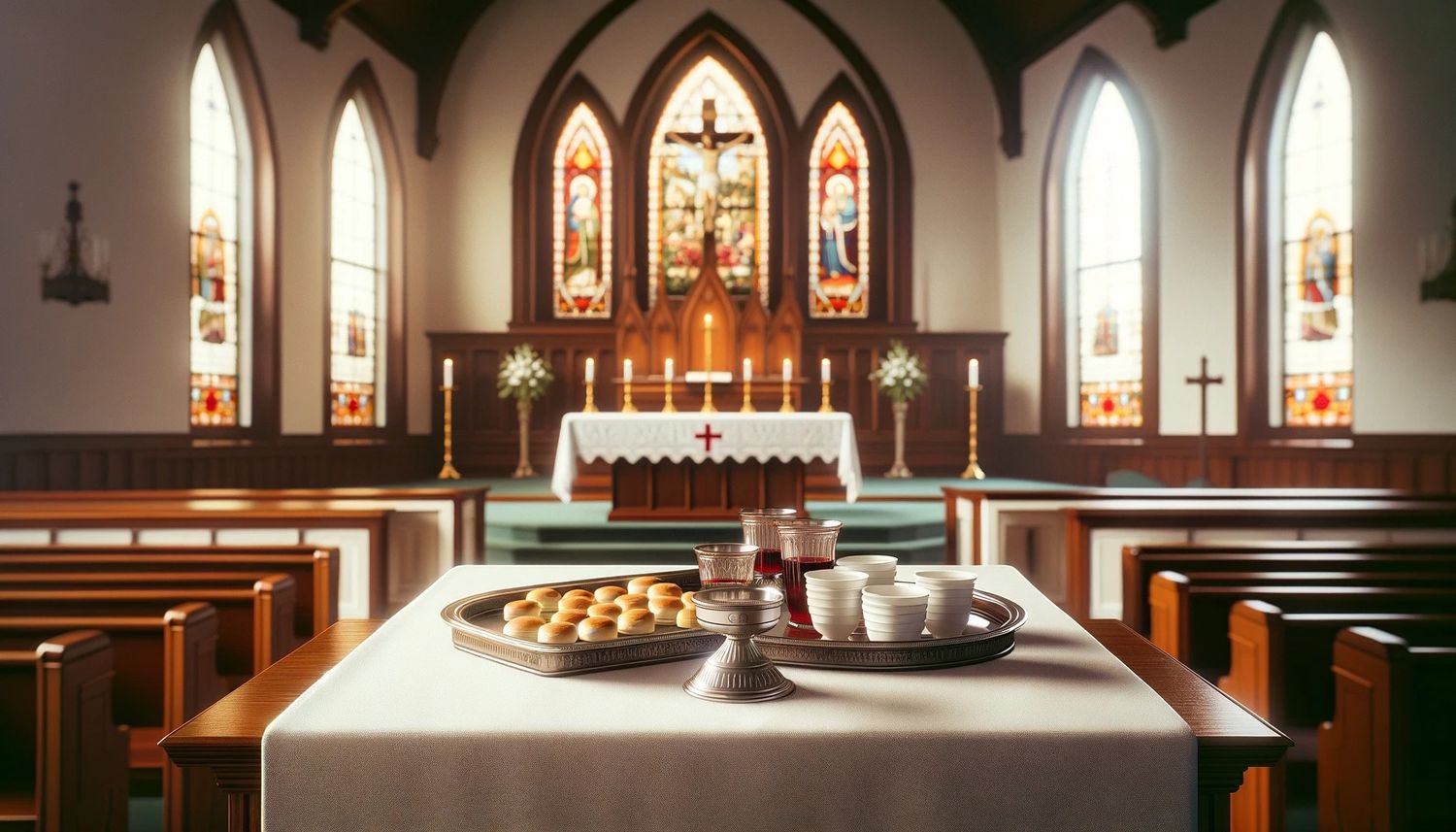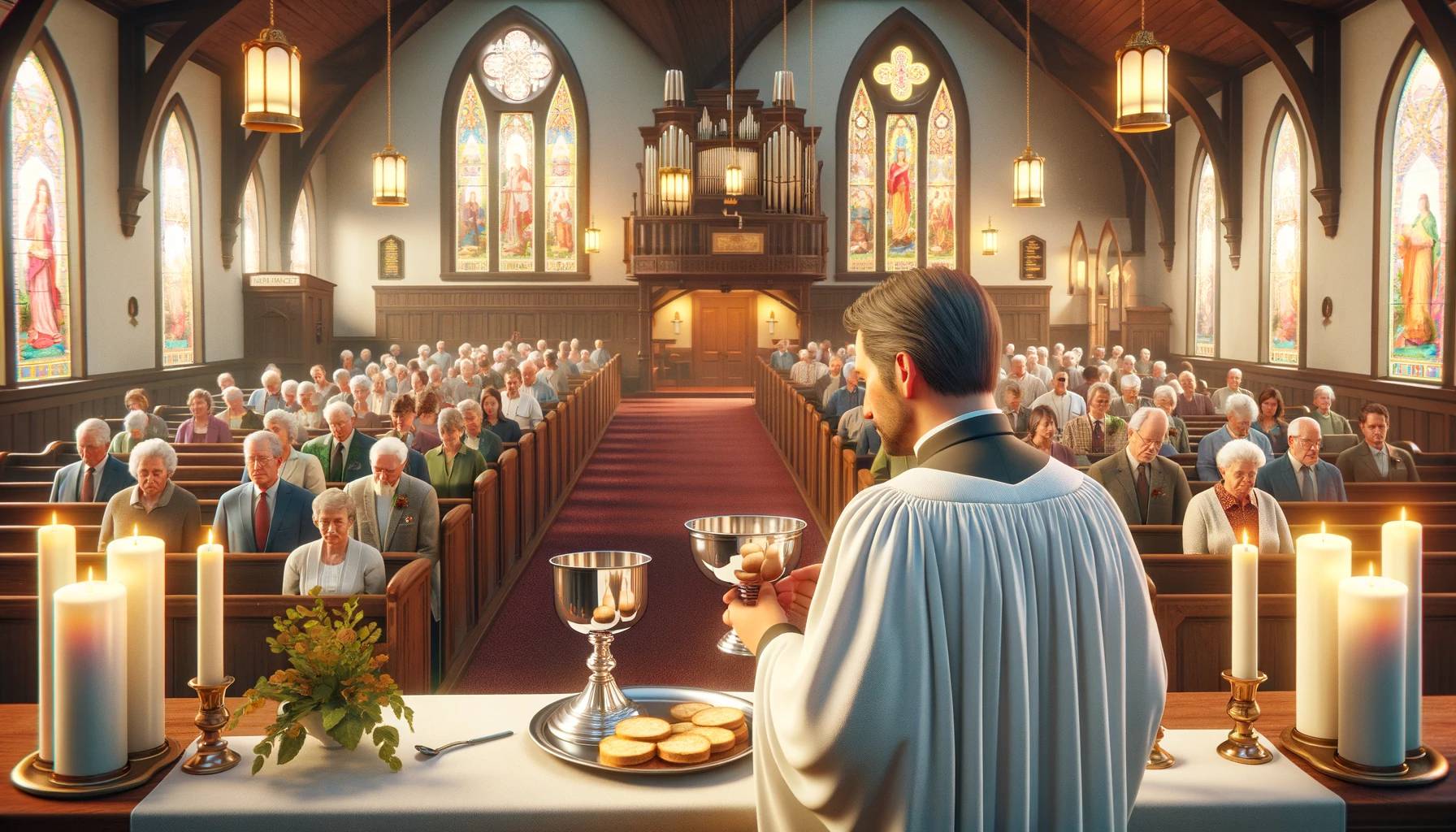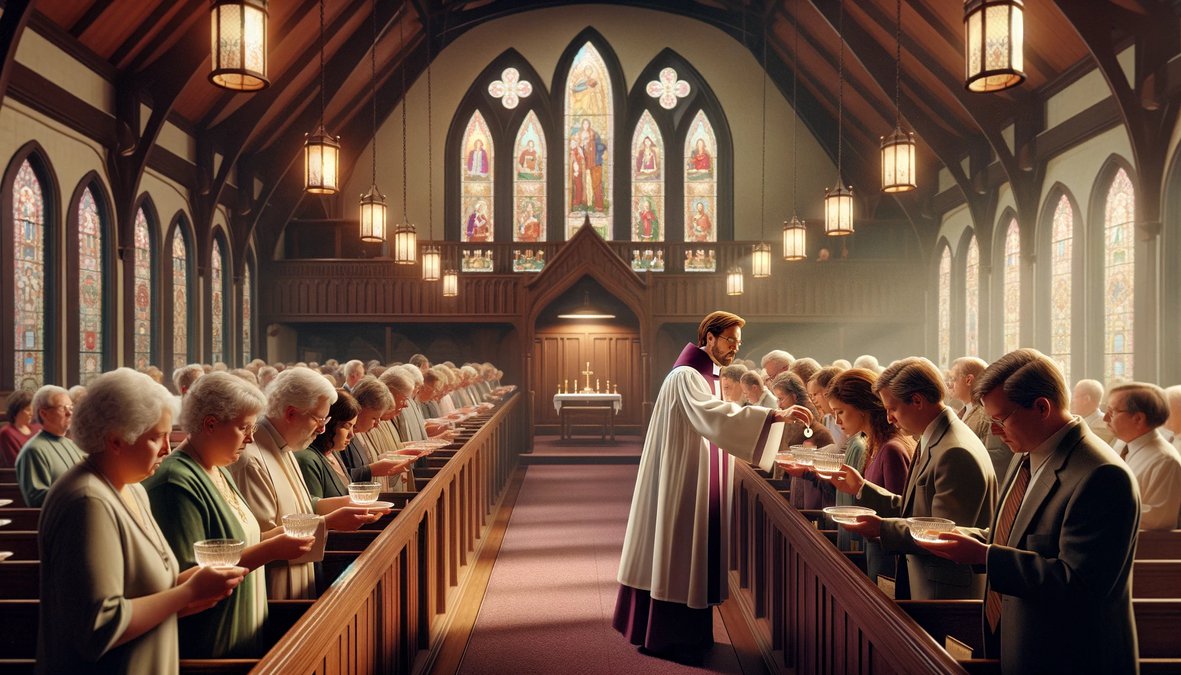Home>Theology and Spirituality>How To Serve Communion In The Baptist Church


Theology and Spirituality
How To Serve Communion In The Baptist Church
Published: February 23, 2024
Peter Smith, Editorial Director at Christian.net, combines deep insights into faith, politics, and culture to lead content creation that resonates widely. Awarded for his contributions to religious discourse, he previously headed a major organization for religious communicators, enhancing dialogue on faith's societal impacts.
Learn the proper way to serve communion in the Baptist Church and understand its significance in theology and spirituality. Discover the essential practices and guidelines for a meaningful communion service.
(Many of the links in this article redirect to a specific reviewed product. Your purchase of these products through affiliate links helps to generate commission for Christian.net, at no extra cost. Learn more)
Table of Contents
Introduction
Communion, also known as the Lord's Supper or the Eucharist, holds a central place in the worship and spiritual life of the Baptist Church. It is a sacred ritual that commemorates the sacrificial death and resurrection of Jesus Christ. The act of partaking in Communion is deeply symbolic, representing the believer's union with Christ and fellow members of the faith community.
In the Baptist tradition, Communion is a solemn and reverent occasion, marked by reflection, gratitude, and spiritual renewal. It serves as a tangible expression of the believer's faith and a reminder of the profound love and grace extended by God through the sacrifice of His Son.
The observance of Communion in the Baptist Church is rooted in the teachings of the New Testament, particularly the accounts of the Last Supper as recorded in the Gospels of Matthew, Mark, and Luke, as well as the writings of the Apostle Paul in the book of 1 Corinthians. These biblical passages provide the theological foundation for the practice of Communion, emphasizing its significance as a means of proclaiming the Lord's death until His return and fostering unity within the body of believers.
As we delve into the intricacies of serving Communion in the Baptist Church, it is essential to approach this sacred act with reverence, understanding, and a heart inclined towards spiritual communion with God and fellow believers. The process of preparing for, conducting, and concluding a Communion service is a sacred responsibility that requires careful attention to detail and a deep appreciation for its spiritual significance.
In the subsequent sections, we will explore the profound significance of Communion in the Baptist Church, the meticulous preparations involved in conducting a Communion service, and the reverent manner in which this sacred ritual is carried out. Through this exploration, we aim to gain a deeper understanding of the spiritual and practical aspects of serving Communion in the Baptist tradition.
Read more: Who Can Serve Communion
Understanding the significance of Communion in the Baptist Church
Communion, also referred to as the Lord's Supper, holds profound significance in the spiritual tapestry of the Baptist Church. It is a sacred practice that symbolizes the central tenets of the Christian faith, serving as a poignant reminder of the sacrificial death and triumphant resurrection of Jesus Christ. At the heart of Communion lies the concept of spiritual nourishment and unity within the body of believers, encapsulating the essence of the Gospel message.
In the Baptist tradition, Communion is a tangible expression of the believer's intimate union with Christ and fellow members of the faith community. It serves as a solemn commemoration of Christ's redemptive work on the cross, underscoring the foundational belief in the atoning power of His blood and the transformative nature of His sacrifice. Through the act of partaking in the elements of bread and wine (or grape juice), believers engage in a profound spiritual communion with the living Christ, reaffirming their faith and devotion to Him.
Moreover, Communion in the Baptist Church embodies the principles of remembrance and proclamation. As believers partake in the symbolic elements, they reflect on the profound significance of Christ's sacrifice, expressing gratitude for His unmerited grace and unwavering love. This act of remembrance not only honors the historical event of the Last Supper but also serves as a continual proclamation of Christ's redemptive work, affirming the believer's hope in His imminent return and the ultimate fulfillment of His kingdom.
Furthermore, Communion fosters a sense of spiritual unity and fellowship within the faith community. As believers gather around the Communion table, they are reminded of their shared identity as members of the body of Christ, transcending individual differences and uniting in their common faith and devotion. This communal aspect of Communion underscores the Baptist belief in the priesthood of all believers, emphasizing the equal standing of every individual before God and the interconnectedness of the faith community.
In essence, the significance of Communion in the Baptist Church extends far beyond a mere ritualistic observance. It encapsulates the core tenets of the Christian faith, serving as a tangible expression of spiritual nourishment, remembrance, proclamation, and unity within the body of believers. As we delve into the sacred practice of serving Communion in the Baptist tradition, it is imperative to recognize and honor the profound significance of this timeless sacrament, embracing it as a sacred expression of faith, hope, and communal devotion.
Preparing for Communion service
The preparation for a Communion service in the Baptist Church is a meticulous and reverent process that underscores the sacred nature of this spiritual observance. It involves careful attention to detail, thoughtful planning, and a deep sense of reverence for the significance of the Lord's Supper. The following steps outline the essential aspects of preparing for a Communion service:
-
Spiritual Preparation: Before embarking on the logistical aspects of preparing for Communion, it is crucial to engage in spiritual preparation. This involves prayerful reflection on the profound significance of Communion, seeking spiritual discernment, and cultivating a heart of reverence and gratitude. The spiritual preparation sets the tone for the entire Communion service, infusing it with a sense of sacredness and spiritual depth.
-
Logistical Planning: The practical aspects of preparing for Communion encompass logistical planning, including the procurement of Communion elements such as unleavened bread and wine (or grape juice). It is essential to ensure that these elements are obtained with care and reverence, reflecting the solemnity of their intended use during the service.
-
Communication and Coordination: Effective communication and coordination among church leaders, clergy, and volunteers are vital in ensuring a seamless preparation process. Clear communication regarding roles, responsibilities, and logistical details helps streamline the preparation efforts and fosters a sense of unity and purpose among those involved in facilitating the Communion service.
-
Sanctuary Arrangement: The physical arrangement of the sanctuary or worship space plays a significant role in preparing for Communion. This may involve setting up the Communion table, arranging the seating for congregants, and creating a reverent atmosphere conducive to reflection and spiritual communion.
-
Practical Considerations: Attention to practical considerations, such as ensuring the cleanliness and orderliness of the Communion vessels, linens, and other ceremonial items, is essential. Additionally, the provision of any necessary accompaniments, such as trays, cups, and napkins, should be carefully attended to in preparation for the service.
-
Scriptural and Devotional Preparation: Engaging in scriptural and devotional preparation, including the selection of relevant biblical passages, hymns, and prayers that align with the theme of Communion, contributes to the spiritual depth and coherence of the service. Thoughtful consideration of these elements enriches the overall worship experience and reinforces the spiritual significance of Communion.
In essence, preparing for a Communion service in the Baptist Church encompasses a holistic approach that integrates spiritual, logistical, and practical elements. It is a sacred endeavor that calls for intentional reverence, meticulous attention to detail, and a deep commitment to honoring the profound significance of the Lord's Supper. Through thoughtful preparation, the Communion service becomes a poignant and transformative experience, inviting believers to partake in a sacred communion with Christ and fellow members of the faith community.
Setting up the Communion table
Setting up the Communion table in the Baptist Church is a sacred and deliberate process that embodies the reverence and significance of the Lord's Supper. The Communion table, often positioned at the front of the sanctuary or worship space, serves as the focal point for the solemn observance of Communion, symbolizing the spiritual banquet where believers partake in the body and blood of Christ in a symbolic manner.
The following steps outline the meticulous process of setting up the Communion table, ensuring that every aspect reflects the solemnity and reverence befitting this sacred ritual:
-
Table Preparation: The Communion table is meticulously prepared to create a reverent and dignified setting for the observance of the Lord's Supper. It is adorned with a pristine white linen cloth, symbolizing purity and the righteousness of Christ. The careful arrangement of the linen reflects the sacred nature of the Communion table as the focal point of spiritual communion and remembrance.
-
Placement of Communion Elements: The placement of the Communion elements, including unleavened bread and wine (or grape juice), is carried out with utmost care and reverence. The bread, symbolizing the body of Christ broken for believers, is positioned on a paten or plate, while the wine or grape juice, symbolizing the blood of Christ shed for the remission of sins, is placed in a chalice or individual cups. The deliberate arrangement of these elements underscores their significance in the Communion service.
-
Ceremonial Vessels and Accoutrements: The Communion table is adorned with ceremonial vessels and accoutrements, such as a communion plate, chalice, and any additional ceremonial items used in the service. These vessels are meticulously arranged, reflecting the solemnity of their purpose and the reverence with which they are handled during the Communion service.
-
Liturgical Symbols and Decor: The Communion table may be adorned with liturgical symbols and decor that accentuate the spiritual significance of the Lord's Supper. This may include the placement of a cross, symbolic imagery, or floral arrangements that evoke a sense of reverence and spiritual contemplation, enhancing the sacred ambiance of the Communion table.
-
Sanctuary Arrangement: The positioning of the Communion table within the sanctuary or worship space is carefully considered to ensure its prominence and visibility. The table is often placed in a central location, signifying its centrality to the worship experience and inviting congregants to partake in the spiritual banquet with reverence and awe.
In essence, the meticulous process of setting up the Communion table in the Baptist Church reflects a deep reverence for the sacred ritual of Communion. Every aspect of the table's preparation is imbued with intentionality, symbolizing the believer's spiritual communion with Christ and fellow members of the faith community. As the Communion table is prepared with care and reverence, it becomes a tangible representation of the profound significance of the Lord's Supper, inviting believers to partake in a sacred and transformative communion with the living Christ.
Conducting the Communion service
The act of conducting the Communion service in the Baptist Church is a sacred responsibility that demands reverence, solemnity, and a deep appreciation for the spiritual significance of this timeless ritual. As believers gather around the Communion table, the conduct of the service serves as a poignant expression of their faith, unity, and devotion to Christ.
The following steps outline the meticulous process of conducting the Communion service, ensuring that every aspect reflects the solemnity and reverence befitting this sacred observance:
-
Invocation and Scripture Reading: The service commences with an invocation, inviting congregants to enter into a spirit of reverence and reflection. This is often followed by the reading of relevant biblical passages that illuminate the significance of Christ's sacrifice and the spiritual nourishment offered through Communion.
-
Exposition and Reflection: A period of exposition and reflection may ensue, during which the minister or officiant expounds on the significance of Communion, emphasizing its role in proclaiming the Lord's death and fostering spiritual unity within the faith community. This segment invites congregants to engage in introspection and gratitude for the redemptive work of Christ.
-
Prayer and Thanksgiving: A solemn prayer of thanksgiving is offered, expressing gratitude for the sacrificial love of Christ and the opportunity to partake in the spiritual banquet. This prayer serves as a collective expression of reverence and gratitude, uniting believers in a shared acknowledgment of God's grace and provision.
-
Distribution of Communion Elements: With reverence and solemnity, the minister or designated individuals distribute the Communion elements to congregants. Each individual receives the bread, symbolizing the body of Christ, and partakes in the wine or grape juice, symbolizing the blood of Christ, in a manner that reflects the sacredness of the act.
-
Reflection and Communal Participation: As congregants partake in the Communion elements, a period of reflective silence or meditative music may accompany the spiritual communion. This allows for personal contemplation and a deepening of the communal experience as believers partake in the symbolic representation of Christ's sacrifice.
-
Closing and Benediction: The service concludes with a closing benediction, invoking God's blessing and guidance upon the congregation as they depart from the Communion table. This benediction serves as a solemn affirmation of God's presence and providence in the lives of believers.
In essence, the conduct of the Communion service in the Baptist Church is a sacred and transformative experience that invites believers to partake in a spiritual communion with Christ and fellow members of the faith community. Through intentional reverence, prayerful reflection, and a deep appreciation for the significance of Communion, the service becomes a poignant expression of faith, unity, and spiritual renewal.
Cleaning up after the Communion service
After the solemn observance of the Communion service in the Baptist Church, the reverent atmosphere and spiritual significance of the occasion extend to the post-service activities, including the meticulous process of cleaning up. This phase of the Communion service reflects a deep reverence for the sacred elements and ceremonial items used during the observance, underscoring the commitment to honor the spiritual significance of the Lord's Supper.
The following steps outline the thoughtful and reverent process of cleaning up after the Communion service, ensuring that every aspect reflects the solemnity and reverence befitting this sacred ritual:
-
Careful Handling of Communion Vessels: The careful handling of Communion vessels, including the communion plate, chalice, and any ceremonial items, is paramount. Each vessel is handled with reverence and attentiveness, reflecting the sacred nature of its purpose and the spiritual significance it embodies.
-
Respectful Disposal of Remaining Elements: Any remaining elements of bread and wine (or grape juice) are handled with utmost care and reverence. The disposal of these elements is carried out in a manner that honors their sacred symbolism, ensuring that any unconsumed portions are handled with reverence and disposed of in a manner consistent with the church's traditions and beliefs.
-
Cleaning and Maintenance of Communion Table: The Communion table, adorned with a pristine white linen cloth and ceremonial vessels, is meticulously cleaned and maintained. Any remnants of the Communion elements are respectfully removed, and the table is restored to its dignified state, ready to symbolize the spiritual banquet in future observances.
-
Sanctuary Restoration: The sanctuary or worship space is restored to its customary state of reverence and orderliness. Any ceremonial items, linens, or accoutrements used during the Communion service are carefully attended to, ensuring that the sacred ambiance of the space is preserved for future worship and spiritual observances.
-
Reflection and Gratitude: Throughout the cleaning process, a spirit of reflection and gratitude permeates the atmosphere. Those involved in the cleanup activities engage in silent contemplation, expressing gratitude for the spiritual communion experienced during the service and the opportunity to serve in upholding the sacred traditions of the church.
In essence, the process of cleaning up after the Communion service in the Baptist Church is a continuation of the reverent and transformative experience that begins with the observance of the Lord's Supper. Every aspect of the cleanup process is imbued with intentionality, reverence, and a deep commitment to honoring the profound significance of Communion, ensuring that the spiritual sanctity of the service permeates every phase of the observance.
Conclusion
In conclusion, the observance of Communion in the Baptist Church is a sacred and transformative practice that embodies the core tenets of the Christian faith. From the meticulous preparations to the reverent conduct of the service and the thoughtful cleanup that follows, every aspect of serving Communion reflects a deep reverence for the spiritual significance of the Lord's Supper.
The significance of Communion in the Baptist Church extends far beyond a mere ritualistic observance. It serves as a tangible expression of spiritual nourishment, remembrance, proclamation, and unity within the body of believers. The Communion table, meticulously prepared and adorned with symbolic elements, becomes a focal point for believers to partake in a sacred communion with the living Christ, reaffirming their faith and devotion to Him.
The conduct of the Communion service is marked by intentional reverence, prayerful reflection, and a deep appreciation for the significance of Communion. As believers gather around the Communion table, they engage in a spiritual communion with Christ and fellow members of the faith community, fostering a sense of unity and fellowship that transcends individual differences.
Furthermore, the meticulous cleanup process that follows the Communion service underscores the commitment to honor the sacred elements and ceremonial items used during the observance. Every aspect of the cleanup reflects a deep reverence for the spiritual significance of the Lord's Supper, ensuring that the sanctity of the service permeates every phase of the observance.
Ultimately, serving Communion in the Baptist Church is a sacred responsibility that demands reverence, solemnity, and a deep appreciation for the spiritual significance of this timeless ritual. It serves as a poignant expression of faith, unity, and spiritual renewal, inviting believers to partake in a transformative communion with the living Christ and fellow members of the faith community. As the Communion service concludes, the spiritual impact of the observance lingers, inspiring gratitude, reflection, and a renewed commitment to embody the profound significance of Communion in both individual faith journeys and the collective life of the church.














